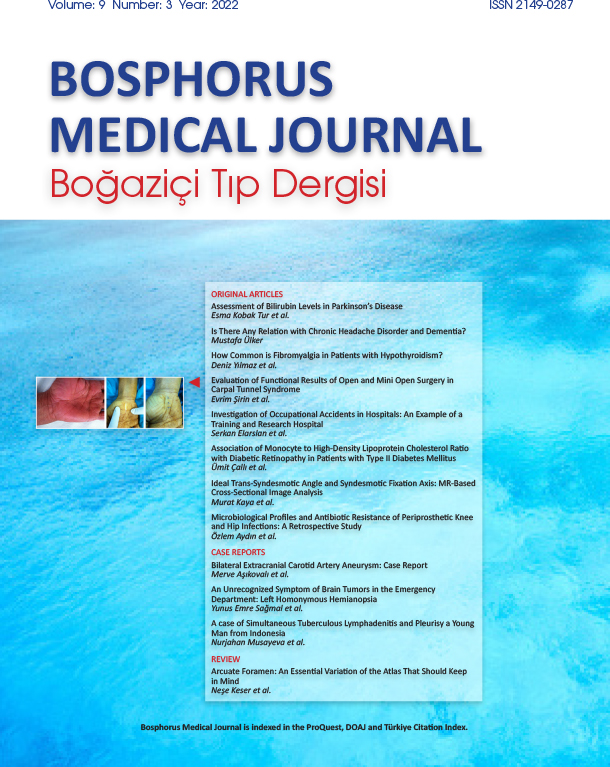Huzursuz Bacak Sendromunda Depresyon ve Uyku Kalitesi
Ceyhun Sayman1, Murat Fatih Pul2, Buse Rahime Hasırcı Bayır11Sağlık Bilimleri Üniversitesi, Haydarpaşa Numune Eğitim ve Araştırma Hastanesi, Nöroloji Kliniği, İstanbul, Türkiye2Sağlık Bilimleri Üniversitesi, Fatih Sultan Mehmet Eğitim ve Araştırma Hastanesi, Nöroloji Kliniği, İstanbul, Türkiye
GİRİŞ ve AMAÇ: Huzursuz bacak sendromu (HBS; diğer adıyla Willis-Ekbom hastalığı) iyi bilinen sensörimotor bir bozukluktur. Hasta bireylerde uyku fragmantasyonu sonucunda yaşam kalitesi etkilenmiş, anksiyete ve depresyon görülme sıklığı artmıştır. Bu çalışmanın amacı, HBS'nin uyku kalitesi, psikososyal yaşam üzerindeki etkileri ve hastalık şiddeti ile ilişkisini ortaya çıkarmaktır.
YÖNTEM ve GEREÇLER: Uluslararası Huzursuz Bacak Sendromu Çalışma Grubu tanı kriterlerine göre, toplam 122 hastaya HBS tanısı konuldu. Tüm katılımcıların sosyodemografik veri formu, Uluslararası Huzursuz Bacak Sendromu Çalışma Grubu Şiddet Ölçeği, Pittsburgh Uyku Kalitesi İndeksi (PSQI), Epworth Uykululuk Ölçeği (EUI) ve Beck Depresyon Envanteri (BDI) nöroloji uzmanları tarafından dolduruldu. Depresif belirtilerin sıklığı, gündüz aşırı uykululuk hali ve kötü uyku kalitesi karşılaştırmalı olarak incelendi.
BULGULAR: Uluslararası Huzursuz Bacak Sendromu Çalışma Grubu kriterlerine göre, primer HBS tanısı almış 122 hasta (94ü [%77] kadın, 28i [%23] erkek) çalışmaya dahil edildi. Hastaların 19'unda (%15,5) HBS şiddet düzeyi hafif-orta, 65'inde (%53,2) şiddetli, 38'inde (%31,2) çok ciddi olarak tespit edildi. HBS hastalarının Beck Depresyon Envanteri ortalama puanı 15,2±9 ve HBS hastalarının Epworth Uykululuk Ölçeği ortalama puanı 5±3,7 olarak bulundu. Hastalığın şiddetine göre belirlenen gruplar arasında istatistiksel olarak anlamlı fark saptanmadı. HBS hastalarının Pittsburgh Uyku Kalitesi İndeksi puan ortalaması 9,5±3,8 olarak bulundu. Hastalığın şiddetine göre belirlenen gruplar arasında istatistiksel olarak anlamlı fark saptandı. Pittsburgh Uyku Kalitesi İndeksinde HBS hasta grupları arasında özellikle uyku süresi, verimliliği ve gündüz uyku bozukluklarında önemli farklılıklar tespit edildi.
TARTIŞMA ve SONUÇ: HBSye depresyon gibi birçok hastalık eşlik eder. Bu komorbid durumların erken tanınması ve tedavisi hastalığın klinik seyri için çok önemlidir.
Depression and Sleep Quality in Restless Legs Syndrome/Willis-Ekbom Disease
Ceyhun Sayman1, Murat Fatih Pul2, Buse Rahime Hasırcı Bayır11Department of Neurology, University of Health Sciences, Haydarpasa Numune Training and Research Hospital, İstanbul, Türkiye2Department of Neurology, University of Health Sciences, Fatih Sultan Mehmet Training and Research Hospital, İstanbul, Türkiye
INTRODUCTION: Restless legs syndrome (RLS)/Willis-Ekbom disease (WED) is a well-known neurological sensory motor disorder. As a result of sleep fragmentation, quality of life has effected and incidence of anxiety and depression increase. Our aim with this study is to obtain the effects of RLS/WED on sleep quality and psychiatric well-being and their relationship with disease severity.
METHODS: In total, 122 RLS/WED was diagnosed with RLS/WED according to the International RLS Study Group (IRLSSG) diagnostic criteria. All partipicantss sociodemographic data form, IRLSSG severity scale, Pittsburgh Sleep Quality Index (PSQI), Epworth Sleepiness Scale (EUI), and Beck Depression Inventory (BDI) were filled up by senior neurologists. Frequency of depressive symptoms, excessive daytime sleepiness, and poor sleep quality were examined.
RESULTS: 122 patients (94 [77%] female and 28 [23%] male) diagnosed with primary RLS/WED according to IRLSSG criteria were included into the study. The severity level of RLS/WED in 19 (15.5%) of the patients was mild-moderate, 65 (53,2%) were severe, and 38 patients (31,2%) were very serious. BDI mean score of RLS/WED patients is 15.2±9 and EUI mean score of RLS/WED patients is 5±3.7. There was no statistically significant difference between the groups determined according to the severity of the disease. PSQI mean score of RLS/WED patients is 9.5±3.8. There was statistically significant difference between the groups determined according to the severity of the dis-ease. Significant differences between the groups of RLS/WED patients were found on PSQI, especially in sleep duration, efficiency, and daytime sleep dysfunction.
DISCUSSION AND CONCLUSION: Many diseases such as depression accompany with RLS/WED. Early recognition and treatment of these comorbid conditions is very important for the clinical progression of the disease.
Sorumlu Yazar: Ceyhun Sayman, Türkiye
Makale Dili: İngilizce



















